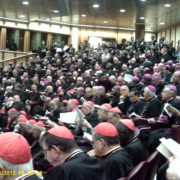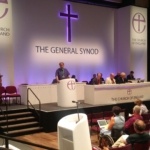An (unauthorised) background paper for the General Synod.
The General Synod of the Church of England meets in London next week (20-23 February, 2019). The main theme of the Synod is evangelism in different shapes and forms. On Wednesday we will have perspectives from the wider Anglican Communion on Evangelism and Discipleship. On Friday there are three debates. The first welcomes and takes note of the report from the Archbishops’ Evangelism Task Group and commends the work of the new national Evangelism and Discipleship Department. The second explores growing faith among children and young people. The third explores Estates Evangelism. Finally, on Saturday, Synod will debate a private member’s motion from Mark Russell on encouraging youth evangelism.
Last week I read all of the background papers on evangelism at a single sitting. I’m delighted that the Synod is giving so much time to the ways in which the Church shares the good news. Each of the papers is focused and practical in its own way. But I was also left feeling that we would go much further. We need an exploration on what the Church understands by evangelism and how people come to faith which connects with the scriptures and the historic tradition of the Church and with our contemporary culture.
So, I’m offering this additional (unauthorised) paper from my own perspective to feed and nourish the work of the General Synod and the wider church at this time. It’s a personal perspective and an imperfect one but it arises from a sense that as a Church we need to go deeper as well as try harder if we are to bear fruit for the gospel in this generation.
The Synod of Bishops in Rome
 In 2012, I was privileged to be the Anglican fraternal delegate to the Synod of Bishops in Rome. The Synod met for three weeks in October to discuss a single subject: the passing on of Christian faith in the life of the church – evangelism.
In 2012, I was privileged to be the Anglican fraternal delegate to the Synod of Bishops in Rome. The Synod met for three weeks in October to discuss a single subject: the passing on of Christian faith in the life of the church – evangelism.
Over 400 people assembled in the Vatican over three weeks. The initial work of the Synod was to listen to five-minute contributions from every part of the world. There was widespread agreement that we live in a time when the passing on of Christian faith is challenging and difficult everywhere.
There was widespread agreement around two further themes. The first is that the Church therefore needs to reflect more, not less, on the reasons for this and our response. The second is that as a Church we need to begin not with techniques or methods but with Christ: dwelling deeply, seeing the face of Christ afresh, exploring again the joy of the gospel.
Much of the Church is weary. Many have fished all night and caught nothing. We need first to listen to Jesus again and find hope and renewal before we put out into deep water and let down the nets.
There have been very significant shifts in our culture and the place of the church within our culture. We understand them only in part. But I believe more and more of the Church of England recognises now that technical solutions are not the answer. I have found more and more over the last three years that when I speak about church growth and how to do evangelism the energy leaves the room.
If I show even a hint of a downward sloping graph, I lose my audience completely. But when I speak of Christ and the wonder and character of Christ and the need to begin from a place of hope and love and nurture the Church as the Body of Christ in very simple ways, the energy levels rise and there is fresh hope and vision.
This is not because people are unwilling to face reality. I think our congregations and communities understand the reality of our situation very well indeed. I think we recognise together that technique or finance or strategies cannot of themselves “solve” the problem. We need as a Church to gather again around Jesus Christ and his gospel and find there renewal and healing and life for us and for the world. These convictions undergird the vision and call we are exploring in the Diocese of Oxford, to be a more Christ like Church for the sake of God’s world: more contemplative, more compassionate and more courageous.
Two papers
The purpose of a Roman Catholic Synod of Bishops is to offer advice to the Pope. The Synod was called by Pope Benedict, but just before he lay down his office. The Synod’s themes and conclusions were taken into Pope Francis’ first apostolic letter, The Joy of the Gospel, published in November, 2013
Every member of General Synod would benefit from reading at least the opening chapters of The Joy of the Gospel in preparation for General Synod this week to catch a sense of the wonder of Christ and of the message of life entrusted to the Church.
In case you don’t have time, here are some extracts from the opening paragraphs to whet your appetite:
The joy of the gospel fills the hearts and lives of all who encounter Jesus. Those who accept his offer of salvation are set free from sin, sorrow, inner emptiness and loneliness. With Christ joy is constantly born anew.
The great danger in today’s world, pervaded as it is by consumerism, is the desolation and anguish born of a complacent yet covetous heart, the feverish pursuit of frivolous pleasures, and a blunted conscience. Whenever our interior life becomes caught up in its own interests and concerns, there is no longer room for others, no place for the poor. God’s voice is no longer heard, the quiet joy of his love is no longer felt, and the desire to do good fades. This is a very real danger for believers too. Many fall prey to it, and end up resentful, angry and listless. That is no way to live a dignified and fulfilled life; it is not God’s will for us, nor is it the life in the Spirit which has its source in the heart of the risen Christ (The Joy of the Gospel, 1-3).
I invite all Christians, everywhere, at this very moment, to a renewed personal encounter with Jesus Christ, or at least an openness to letting him encounter them; I ask all of you to do this unfailingly each day.
I returned from the Synod and wrote a discussion paper on “The Seven Disciplines of Evangelism” for the House of Bishops and the Archbishops’ Council. The paper was revised and formed an appendix to GS 1895: Challenges for the Quinquennium, debated in July 2013. I revised the ideas again for a further Synod paper debated in November 2013 on Intentional Evangelism, written with the Bishops of Chelmsford and St. Albans.
This is the paper (and debate) which established the Archbishops’ Task Group on Evangelism. The debate this coming Friday is the other end of the arc as General Synod takes note of the Task Group’s work and the work plans of the new national Evangelism and Discipleship Department.
General Synod members might want to read it again and refer in particular to the account of the journey we have been on in evangelism as a Church over the last thirty years.
Seven Disciplines of Evangelism
The word evangelism is used in different ways. We need to be aware of this as we enter these debates. Sometimes it is used to refer to a whole cluster of ways in which the Church passes on the faith. The Roman Catholic Church uses the word “Evangelisation” in this way. Sometimes it is used simply for the initial communication of faith through one to one conversation or in preaching: one part of this bigger process.
For me there are seven essential disciplines in this bigger process of evangelisation. I use the word discipline in two senses: something that we are intentional about practising as part of living and proclaiming the gospel and something which we are intentional about exploring as a set of concepts and practices.
Evangelism in turn is one facet or part of God’s mission which embraces the work of service and social action; working for peace and justice and care for creation.
These are the seven disciplines or facets of evangelisation I would encourage the Synod to have in their minds as we enter these debates.
1. Prayerful discernment and listening
This first discipline is both a distinct set of practices and the foundation for each of the others. The transmission of the Christian faith is a divine as well as a human activity. It is only possible in the life of the Spirit. This deep truth is carried in the story of Pentecost and Jesus’ instruction to the disciples to wait for the power of the Spirit. It is carried in the beautiful picture of the vine, where it is the life of Christ which flows into the branches and bears fruit. The Church is called to abide deeply in Christ continually as the foundation and source of her life through prayer, worship and the sacraments. Contemplation is the wellspring of evangelism1.
This deep abiding in the life of Christ needs to be accompanied by a careful attention to what God is doing already in each different place, community and context and out of that listening to discern carefully the best and most helpful place to begin. One of the features of the gospel stories and the Acts of the Apostles often commented on in the tradition of the Church is the way in which Jesus and the apostles deal in different ways with different people. There are no repetitive formulas to be repeated in each place but prayerful and careful openness to the Spirit and discernment in context. The contextualisation of mission and in the life of the Church flows from this deep and careful listening.
2. Incarnational mission (following the pattern of Jesus)
Like the first of these disciplines, the second needs to run through our practice of each of the others. According to the Gospel of John, Jesus commissioned the disciples with these words: “As the Father has sent me, so I send you” (20.21). The incarnation and the ministry of Jesus is to be the pattern of all Christian mission, including the ministry of evangelization and growing the Church. The discipline of patterning our mission on the life of Christ takes us back to the first discipline of prayerful discernment and attention to context. However, it must also include ensuring that we are a church which not only invites people to come to us, but which continually goes, in different ways, for the blessing of society and in search of the last, the least and the lost, taking the message of salvation.
We must ensure that the evangelization we attempt is not in word only but supported by our actions and our service of the common good and the wider ministry of reconciliation. We must ensure that our evangelization is contextual, that the one gospel takes flesh in different forms with different people and therefore that we must pay attention to the way in which the church takes a particular form in different contexts (inculturation). We must be alert to particular moments of opportunity both as individuals and as a Church in reading the signs of the times, not slaves to a single strategy or programme but alert to the movement of the Holy Spirit. We must be prepared for the untidiness and mess which always accompanies experiment, evangelism and growth. Above all we must clothe our apologetics, our proclamation, our teaching, and our planting and building of the churches in love, without which all we do is nothing.
3. Apologetics (defending and commending the Christian faith)
The discipline of apologetics is the practice of defending and commending the Christian faith in dialogue with individuals, with specific communities and ideas and with whole cultural movements. Its roots are deep in Scripture (in Job and Daniel, in the Acts of the Apostles). It serves to strengthen the faith of believers, to remove obstacles to faith in hearts and minds and to prepare the ground for the initial proclamation of the gospel. It is a discipline which is massively under resourced in theological education and research and in the life of the Church. It is a discipline exercised through a variety of media: through films, novels, new media and the sciences as well as philosophy and theology. It is a ministry exercised in the pulpit, in pastoral encounters, in schools, in engagement in the public domain, in writing and broadcasting.
4. The initial proclamation of the faith
The discipline of evangelism (or the initial proclamation of the faith) is the habit and practice of sowing the seed of the gospel in the lives of those who have not yet heard its life-giving message.
This part of the process, it seems to me, is the focus of most of the papers prepared for this General Synod.
The Scriptures are clear that some are gifted as evangelists. However, all Christian disciples are called to bear witness, to be ready to give account for the hope which is in us. This discipline of consistent witness to our faith through conversation is a key challenge for every Christian and is the task of the whole people of God, not simply the clergy or recognized ministers. One of the major challenges for a church in mission is the equipping of all of its members to bear witness to their faith in the home, the workplace and the wider community.
5. Catechesis (teaching and learning faith)
The discipline of catechesis is the discipline of teaching and learning faith and especially teaching the faith to those preparing for baptism (and confirmation) and those who have been recently baptized as they grow into mature discipleship.
This gradual formation of adults and children and young people is absolutely critical to the growth of the church. It is the discipline through which new disciples are formed and take their place in the life and witness of the Christian community. We need urgently to recover a sense of the family as a primary agent of catechesis in teaching the faith to children and young people. We have tremendous responsibility and potential to develop catechesis in Church of England schools over the next decade as the papers recognise.
This is the area where I have focussed my own thinking over recent years as regular readers of this blog will know. It’s been good to work with the Church of England’s digital team on the new Pilgrim Journeys resources for Lent and Easter.
As part of this journey and process of catechesis there will be often be the opportunity to pray with and for individuals in those moments when they place their faith in Jesus Christ and make the faith their own.
6. Ecclesial formation (growing the community of the church)
The discipline of ecclesial formation is the discipline of growing the community of the church as the number of disciples grows. In many places, church congregations are now primary communities not subsets of existing communities. As a number of authorities recognize, making disciples (rather than converts) is absolutely vital.
Christian disciples need more formation and intentional support in living out their discipleship in a more secular environment. The Church of England has recognised this most recently in the report, Setting God’s People Free. This discipline, like the others, has very deep roots in scripture and the tradition (“My little children, for whom I am again in childbirth until Christ is formed in you” Gal. 4.19).
7. Planting and forming new ecclesial communities (fresh expressions of church)
This is the discipline rooted in the earliest days of the New Testament Church which has been slowly recovered in the Church of England through the insights of returning missionaries such as Roland Allen, the church planting movement, Mission-Shaped church and the development of fresh expressions of church.
As a Church we have invested significantly in this discipline in recent years. The growth in fresh expressions of church over the last decade has been remarkable as the research pioneered by Church Army has demonstrated. Again, there a discipline here connected to Scripture and the Christian tradition in which the church needs to be continually formed.
And finally…
I hope and pray that each of the General Synod debates this week on evangelism is fruitful, lively and life giving. I hope and pray that much good flows from the new Evangelism and Discipleship Team, the Estates Initiative, the Growing Faith work and the renewed call for evangelism among young people.
But I hope and pray most of all that those who speak in these debates will not simply seek to motivate the church out of guilt or despair or offer technical solutions to deep seated spiritual and cultural questions. I hope and pray that as we listen to the debates we will be inspired with a fresh vision of Jesus Christ and his life and character and death and resurrection and renewed in the power of the Spirit to pass on the wonderful gospel of God’s love in the whole of our life together.

See also: Bishop Steven’s speech to the General Synod, February 22 2019: Evangelism in today’s culture
1 See the address by the then Archbishop of Canterbury, Rowan Williams to the Synod of Bishops


